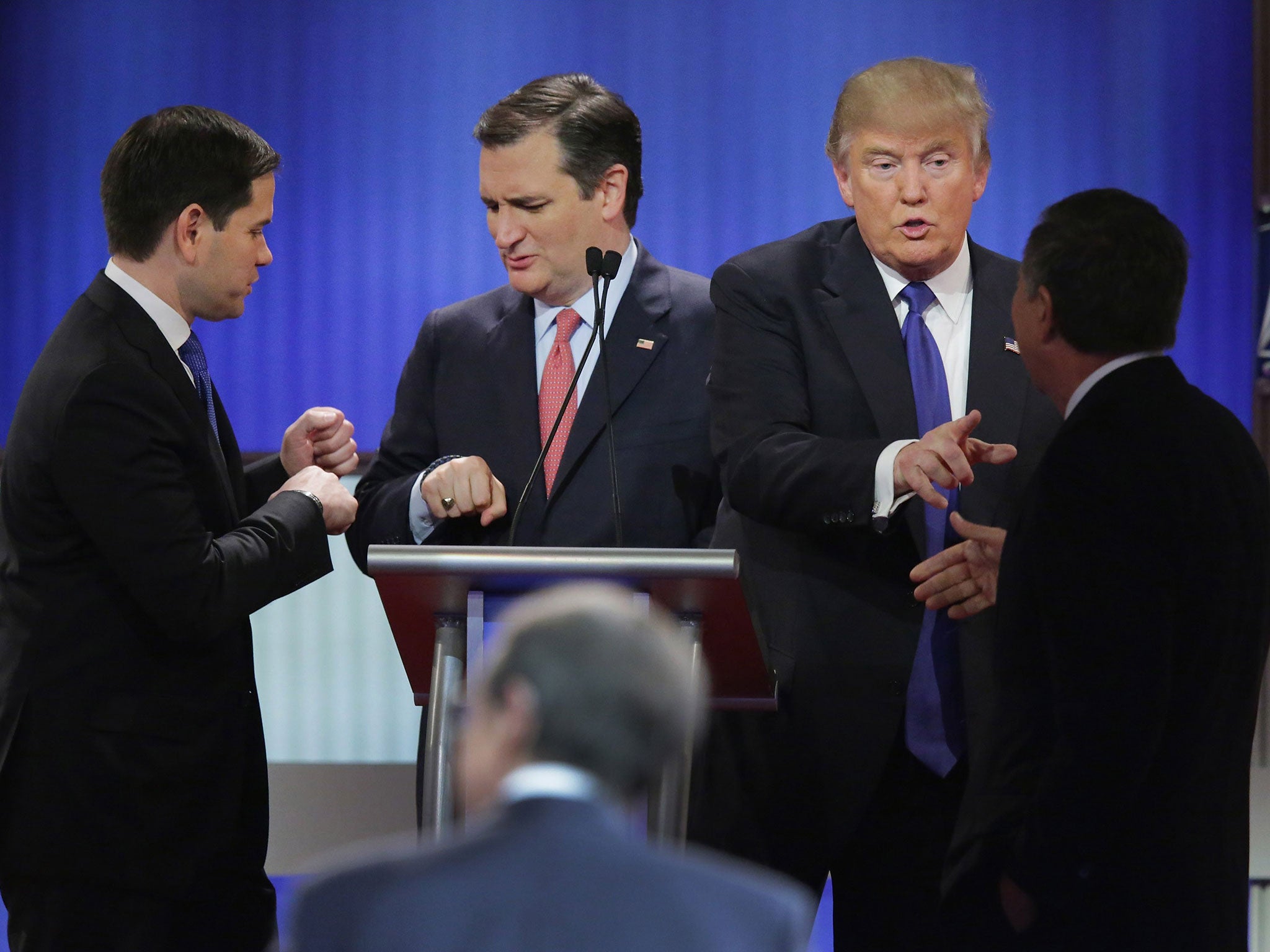US election 2016: Donald Trump and Ted Cruz call for 'one-on-one' after Super Saturday wins
The results will give a glimmer of hope to those still striving to keep the GOP nomination out of Mr Trump’s reach

Your support helps us to tell the story
From reproductive rights to climate change to Big Tech, The Independent is on the ground when the story is developing. Whether it's investigating the financials of Elon Musk's pro-Trump PAC or producing our latest documentary, 'The A Word', which shines a light on the American women fighting for reproductive rights, we know how important it is to parse out the facts from the messaging.
At such a critical moment in US history, we need reporters on the ground. Your donation allows us to keep sending journalists to speak to both sides of the story.
The Independent is trusted by Americans across the entire political spectrum. And unlike many other quality news outlets, we choose not to lock Americans out of our reporting and analysis with paywalls. We believe quality journalism should be available to everyone, paid for by those who can afford it.
Your support makes all the difference.Following a week of concerted attacks from the Republican establishment, Donald Trump’s grip on the party’s presidential nomination at last appeared to weaken – just barely – last night. Texas Senator Ted Cruz triumphed in two states, Kansas and Maine, at the so-called “Super Saturday” primaries, further cementing his claim that he is the one remaining GOP candidate capable of beating Mr Trump.
Yet his victories have likely come too late to seriously hinder the New York billionaire, who also claimed a brace of states yesterday: a marginal win over Mr Cruz in Kentucky, and a 20-point landslide in Louisiana, which, with 47 delegates, was the biggest trophy of the weekend.
Speaking last night in West Palm Beach, Florida, Mr Trump urged Marco Rubio to drop out of the race, after the Florida Senator suffered another poor set of results, including a fourth-place finish in Maine. Mr Trump added that he would relish the prospect of a two-way tussle with Mr Cruz. “I would love to take on Ted one-on-one, that would be so much fun,” he said.
The Republican results were mirrored by the Democratic race, with Bernie Sanders securing symbolic victories in Kansas and Nebraska, even as front-runner Hillary Clinton conserved her growing delegate lead with 70-23 per cent triumph over the Vermont Senator in Louisiana.
While the states up for grabs this weekend were minor in terms of their delegate count, the results will give a glimmer of hope to those still striving to keep the GOP nomination out of Mr Trump’s reach. In recent days, GOP donors have ploughed funds into an anti-Trump Super PAC, while several high-profile Republicans have come out against the pugnacious property magnate.
On Thursday the party’s 2012 presidential pick, Mitt Romney, delivered a broadside against The Donald, calling him a “fraud”. Mr Romney laid out a plan to defeat Mr Trump at a brokered party convention. While it may be too late to consolidate voters behind a single non-Trump candidate, his rivals could collectively deprive him of the majority of delegates required to sew up the nomination.
Until recently, Mr Cruz was considered singularly unpalatable to many of his own GOP colleagues, yet he now looks increasingly like the party’s only plausible alternative to Mr Trump. On Saturday the Texas Senator topped a straw poll of conservative activists at the annual Conservative Political Action Conference (CPAC) in Maryland.
With 50.7 per cent in the Kansas caucuses, he also became the first Republican candidate to claim more than half the vote in any state. Campaigning last night in Idaho ahead of that state’s primary on Tuesday, Mr Cruz said: “Kansas, CPAC and Maine are all very different sets of voters, and I think what it represents is a Republican party coalescing against Donald Trump.”
Mr Trump’s opponents are already looking ahead to Florida and Ohio, two delegate-rich, winner-take-all states both set to vote on 15 March, where Mr Rubio and Ohio governor John Kasich ought to enjoy home advantages. Yet while a new poll puts Mr Kasich in front in Ohio, Mr Trump appears to have a double-digit lead over Mr Rubio in Florida. Meanwhile, Mr Cruz is reportedly planning to campaign hard in the Sunshine state, in hopes of knocking Mr Rubio out of the race altogether.
For Bernie Sanders, Super Saturday offered a repeat in miniature of Super Tuesday, with the socialist Senator from Vermont unable to attract significant support in the South, where African-American voters have come out overwhelmingly on Ms Clinton’s side. Her win in Louisiana will have given her almost as many delegates as Mr Sanders’ collected in Kansas and Nebraska combined.
Join our commenting forum
Join thought-provoking conversations, follow other Independent readers and see their replies
Comments